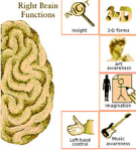U
Understand your Unconscious
We all have a conscious mind and an unconscious mind. Our conscious mind is the bit we are aware of, hence “conscious” mind. Our unconscious mind is the bit we are not aware of, hence “unconscious” mind. Our unconscious does so much for us and of course until we are made conscious of it, it stays in our unconscious. From the very basics, like breathing to walking, or sitting. Our unconscious mind orders all our basic bodily functions, a bit like a back office sorting out all the front office paperwork so it can run smoothly without interruption. But do you understand what the other functions of you unconscious mind are? Well let me list some of them and explain them a bit more for you:
Creativity:
All our creativity comes from our unconscious minds. The things we make up in our heads come from here, we bring them into our conscious thoughts and expand on them, but they start in our unconscious. As a famous quote says, “if I can dream it, I can create it”
Try this little exercise: if you are right-handed, use your left hand and vise versa. Get a sheet of paper and a pen or pencil and sit down, clear your mind (hum if it helps clear the thoughts from your head) and now just write to your sixteen year old self, or draw a picture for your sixteen year old self. Just let your hand take the pencil or pen through the process without guidance from you consciously. Now look at what you’ve put on the paper. If you’d tried to do this consciously you’d have stopped yourself less than halfway through because your conscious self would have seen “gibberish” that just wasn’t logical, but your unconscious doesn’t have those limitations.
Storing Memories
Our unconscious stores all our memories. Can you imagine how big our minds would have to get to be able to store all the information that we learn and absorb? Try this little exercise: Think of something that happened to you last Friday, something good. Notice that it comes into your awareness from somewhere else, that it wasn’t already there in your consciousness waiting for you to call it back, it was called up/in from somewhere else? That is your unconscious mind doing it’s job properly, so that your conscious mind can get on with all the things it has to do. Our unconscious mind will also repress memories with unresolved negative emotions, which is why we sometimes can’t remember traumatic events. But it will also present those unresolved memories for resolution at a later date. In effect it is protecting us from things we can’t deal with at the time and storing them for dealing with at a later date, when we are more capable of resolving those issues.
Runs Your Body
As I stated at the top of this post your unconscious mind does all the “back office” stuff when it comes to our bodies. It sends
messages back and forth to our brains along what are called neural networks. They range from instructing the brain to instruct our noses to inhale air into our lungs, instructing our lungs to expand to take in that air, extract the oxygen from that air, pass it through the vessels into our bloodstream, instructing the vessels to allow the oxygen to get through, instructing the blood to carry it through our body depositing the oxygen to the bits that require it and collect carbon dioxide after dropping off the oxygen….phew!! This is just a small part of breathing, and we do it thousands upon thousands of times a day, every day! Can you imagine how difficult it would be to have other thoughts if our conscious mind was taken up with the day-to-day running of our bodies: breathing, heart pumping, eating, digesting, moving, etc. Without our unconscious doing all that work we wouldn’t be able to function properly.
Looks After The Emotions
Our conscious mind looks after the logical side of things and our unconscious mind looks after the emotional side of things. It isn’t good to be completely logical, nor is it good to be completely emotional. It is best to have a balance of both. To varying degrees most of us do, but we tend to favour one or the other. In fact if you start probing emotional issues with someone who bases their life mostly in logic, you are likely to see them get very, very uncomfortable and very quickly too and this is because they are not comfortable with emotional issues. Chances are they will probably belittle emotions as over-reacting while not realising that they themselves are also over-reacting and in a negative way too. On the other hand ask someone who bases their life on emotions to look at something logically and they are likely to tell you that you’ve taken the heart out of everything, that it is too cold a way to look at something. The best way is with a combination of both logic and emotion.
Highly Moral And Intuitive
Your unconsious mind looks after your intuition. I blogged about this before, see: Involve your Intuition a few posts back along this A – Z series. It knows instinctively what is good and not good for you and that is why you get a “feeling” or “sense” when something just isn’t right for you. Or why you “just know” when you are in a dangerous situation. It is your unconscious warning you. Yourunconscious is also highly moral, so if you get a sense of
foreboding or a feeling of something not being right when you intend to do something that you know is wrong, it is your unconscious warning you that you are crossing one of your moral boundaries and to take note. The morals that we accept as we grow up get embedded into our unconscious mind and stay there until we amend or change them.
Does Not Process Negatives
Yes, it’s true, your unconscious mind deletes all negatives from anything presented to it. It is something that the unconscious doesn’t get to grips with, that belongs to the conscious mind. So by stating things negatively the very first thing our unconscious mind does is go through the sentence and delete all the negatives. For example if I said I didn’t want to be a relationship with a boorish bullying brute of a man, my unconscious would take out the “didn’t” and then being the very obliging thing that it is, it would direct me towards what I was asking for. On the same level, if I said I wanted a relationship with a considerate, nice looking friendly man it would again direct me towards my goal. Since it doesn’t process a negative and will automatically delete any negative presented to it, isn’t it better to present positively stated goals in the first place and prevent all the difficult situations that are continually cropping up because of the way you think them?
Hopefully this will go some way to explaining the lesser known part of our minds to you. It might also help you understand yourself a bit better and it may also help you to understand other people around you too. With understanding comes acceptance for ourselves and others and that is a good thing.


